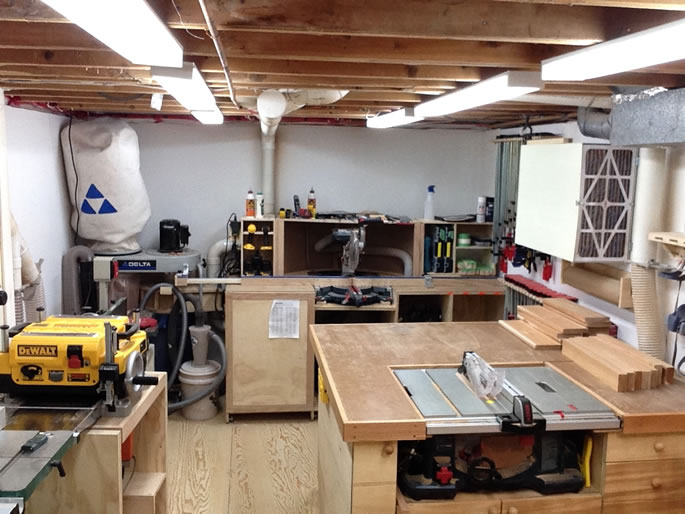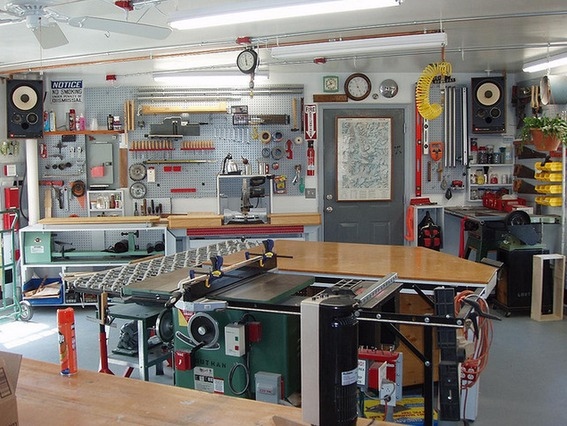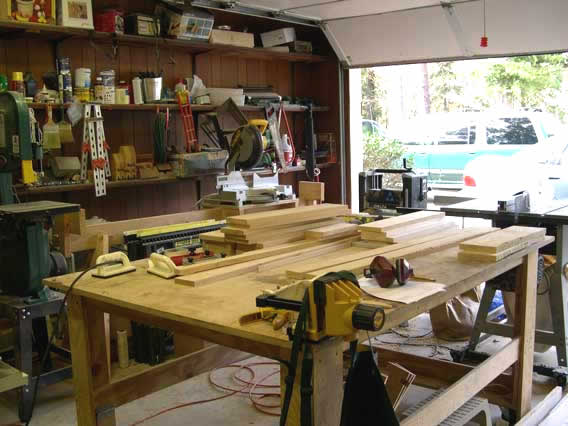Are you a woodworking enthusiast with a limited budget? Look no further! In this article, you will discover a comprehensive guide on how to set up a fully equipped small woodworking workshop for under $1000. With a carefully curated shopping list of tools and helpful links to buy them at the best prices, you can rest assured that you won’t break the bank. The author, drawing from personal experiences, also offers valuable insights on avoiding bad quality tools and shares tips to overcome common problems faced by beginner woodworkers, such as tool selection and limited workshop space. Additionally, be prepared to learn about the pitfalls of losing money on tools through fake reviews, buying old tools that aren’t in good condition, opting for low-quality options, purchasing excess or extremely inexpensive tools, and relying solely on big box retailers. Get ready to embark on your woodworking journey without worrying about your budget constraints!
Choosing the Right Tools
When it comes to woodworking, having the right tools is essential to ensure that your projects turn out beautifully. But with so many options available, how do you know which tools to choose? This section will guide you through the process of researching and selecting the best tools for your woodworking needs.

Researching Tools
Before making any purchases, it’s important to take the time to thoroughly research the tools you are considering. Look for reviews from other woodworkers to get an idea of the quality and performance of the tools. Pay attention to both positive and negative reviews to get a well-rounded understanding.
Quality vs. Price
One common dilemma when selecting tools is the choice between quality and price. While it can be tempting to opt for the cheapest option available, keep in mind that investing in a higher quality tool will often save you money in the long run. High-quality tools are built to last and can withstand the demands of woodworking, whereas cheaper tools may break or wear out quickly.
Essential Woodworking Tools
To get started with woodworking, there are a few essential tools that you’ll need to have in your arsenal. These tools will serve as the foundation for your woodworking projects and will allow you to tackle a wide range of tasks.
Creating a Budget
Once you have an idea of the tools you’ll need, it’s time to create a budget. Setting a budget will help you prioritize your purchases and ensure that you stay within your financial means.
Determining Your Budget
Before determining your budget, consider how much you are willing to invest in your woodworking hobby. Take into account your current financial situation and how often you plan to use the tools. It’s important to be realistic with your budget to avoid overspending.
Finding the Best Deals
When it comes to buying tools, it’s important to find the best deals to stretch your budget. Look for sales, discounts, and promotions from various retailers. You can also sign up for newsletters or join online woodworking communities to stay updated on the latest deals.
Buying Secondhand Tools
Another way to save money on tools is to buy secondhand. Many woodworkers upgrade their tools over time, which means there are often gently used tools available at a fraction of the cost of new ones. Check out online marketplaces or local woodworking clubs to find secondhand tools in good condition.
Setting Up Your Workshop Space
Having a dedicated workshop space is essential for woodworking. It provides a place to store your tools, work on your projects, and allows for adequate ventilation and safety. Here are some considerations when setting up your workshop space.
Choosing the Right Space
When choosing a workshop space, consider the size of your tools, the amount of space you have available, and any other factors that may impact your woodworking experience. A basement, garage, or spare room can all make great workshop spaces, as long as they meet your specific needs.
Optimizing the Layout
Once you have chosen your workshop space, it’s important to optimize the layout for efficiency and ease of use. Organize your tools in a way that makes sense to you, ensuring that they are easily accessible. Consider creating dedicated spaces for specific tasks, such as a workbench or a cutting station.
Storage Solutions
Effective storage solutions are crucial for keeping your workshop organized and your tools in good condition. Invest in sturdy shelves, cabinets, and tool chests to keep everything in its place. Consider adding pegboards or wall-mounted racks to hang frequently used tools for easy access.
Must-Have Woodworking Tools for Beginners
Now that you have your workshop space set up, it’s time to start building your tool collection. As a beginner, there are a few must-have tools that will serve as the foundation for your woodworking projects.
Circular Saw
A circular saw is a versatile and essential tool for any woodworker. It can be used for a wide range of cutting tasks, including crosscuts, rip cuts, and bevel cuts. Look for a circular saw with adjustable depth and bevel settings for added versatility.
Router
A router is another essential tool that allows you to create decorative edges, cut grooves, and shape wood. It can be used for a variety of tasks, from creating intricate designs to joining pieces of wood together. Look for a router with variable speed settings and interchangeable bits for maximum flexibility.
Random Orbital Sander
A random orbital sander is a must-have tool for achieving smooth and flawless finishes on your woodworking projects. It removes material quickly and evenly, leaving behind a polished surface. Look for a random orbital sander with variable speed control and a dust collection system for better control and cleanliness.
Chisels
Chisels are fundamental hand tools that are used for shaping, carving, and removing material. They come in various sizes and shapes, allowing you to tackle a wide range of woodworking tasks. Invest in a set of high-quality chisels that can be sharpened easily and hold their edge.
Clamps
Clamps are essential for holding pieces of wood together securely during gluing, assembly, and finishing. They help ensure that your projects stay aligned and prevent any movement or shifting. Invest in a variety of clamps, including bar clamps, pipe clamps, and spring clamps, to accommodate different project sizes and shapes.
Hand Plane
A hand plane is a versatile tool that allows you to smooth and level wood surfaces. It can be used to remove small imperfections, flatten boards, and create smooth surfaces for joinery. Look for a hand plane with an adjustable blade and a comfortable grip for ease of use.

Power Tools on a Budget
Power tools can be a significant investment, but they can also greatly enhance your woodworking capabilities. If you’re on a budget, you can still find versatile power tools that offer excellent performance without breaking the bank.
Choosing Versatile Power Tools
When selecting power tools on a budget, prioritize versatility. Look for tools that can perform multiple tasks to increase their value and usefulness. For example, a compound miter saw can be used for accurate crosscuts, bevel cuts, and compound angle cuts, making it a versatile addition to your workshop.
Comparing Brands and Features
Before making a purchase, take the time to compare different brands and models of power tools. While well-known brands may come with a higher price tag, they often offer superior performance and durability. Consider the features and specifications of each tool to ensure that it meets your specific needs.
Hand Tools for Woodworking
In addition to power tools, hand tools play a crucial role in woodworking. They allow for more precision and control and are often necessary for smaller, detailed tasks. Here are some considerations when choosing hand tools for your workshop.
Choosing Essential Hand Tools
Just like power tools, there are essential hand tools that every woodworker should have in their collection. These include a combination square for accurate measurements, a tape measure for general measuring, a coping saw for intricate cuts, a marking gauge for precise markings, and a block plane for smoothing surfaces.
Finding Quality Hand Tools at Bargain Prices
Hand tools can range significantly in price, but it’s possible to find quality tools at bargain prices if you know where to look. Consider browsing online marketplaces, visiting flea markets or garage sales, or even checking out estate sales. These places often have hidden gems at affordable prices.

Proper Tool Maintenance and Safety
Once you have your tools, it’s important to take care of them to ensure they last. Proper tool maintenance and safety practices are essential for a safe and efficient woodworking experience.
Cleaning and Sharpening
Regularly clean your tools after each use to remove dust, debris, and any buildup. Sharpen blades, chisels, and plane irons regularly to maintain their cutting performance. Invest in a sharpening stone or system to make the process easier and more efficient.
Protective Gear and Equipment
Wearing appropriate protective gear is crucial for your safety in the workshop. Always wear safety glasses or goggles to protect your eyes from flying debris. Use hearing protection to prevent hearing damage from loud power tools. Invest in a good-quality dust mask or respirator to protect your lungs from harmful dust and fumes.
Avoiding Common Mistakes and Money Wasters
When it comes to woodworking, there are common mistakes and money wasters that beginner woodworkers often encounter. By being aware of these pitfalls, you can make informed decisions and avoid unnecessary expenses.
Falling for Fake Reviews
Beware of fake reviews when researching tools. Some manufacturers or sellers may post fake positive reviews to boost sales. Always look for reviews from reputable sources or ask for recommendations from trusted woodworkers.
Buying Old Tools in ‘Good Condition’
While buying secondhand tools can be a great way to save money, be cautious when purchasing old tools in “good condition.” Some sellers may overstate the condition or fail to disclose any defects or issues. Inspect the tools carefully and ask for a demonstration if possible before making a purchase.
Identifying Low-Quality Tools
Low-quality tools can hinder your woodworking experience and may need to be replaced sooner than expected. Look for signs of poor craftsmanship, such as loose parts, uneven or wobbly movements, or flimsy construction. Consider investing in reputable brands known for their quality and durability.
Avoiding Overbuying or Buying Cheap
It can be tempting, especially for beginners, to overbuy or opt for the cheapest tools available. However, this can lead to wasted money and frustration in the long run. Prioritize quality over quantity and invest in tools that will last and perform well, even if it means spending a bit more initially.
Considering Alternative Retailers
While big box retailers may be convenient, they may not always offer the best prices or selection. Consider shopping at specialized woodworking stores, online retailers, or even directly from manufacturers. These alternative retailers often have competitive prices and a wider range of tools to choose from.

Tips for Maximizing Your Budget
To maximize your budget and get the most out of your woodworking experience, consider implementing these tips.
Prioritizing Necessary Tools
When starting out, prioritize purchasing the necessary tools first. Focus on those that will allow you to complete a wide range of basic woodworking tasks. As you gain experience and tackle more complex projects, you can gradually add additional tools to your collection.
Investing in Versatile Tools
Opt for versatile tools that can perform multiple tasks. This allows you to get more value out of each tool and save money in the long run. For example, a combination router can be used for tasks that would typically require multiple separate tools, saving you both money and space in your workshop.
Utilizing Free or Cheap Materials
Instead of spending a fortune on expensive wood, consider using free or cheap materials for your projects. Look for reclaimed or salvaged wood, leftover scraps from construction sites, or even repurpose old furniture. Not only will this save you money, but it will also add a unique and eco-friendly touch to your projects.
Recommended Woodworking Projects for Beginners
Now that you have your tools and workshop set up, it’s time to put them to use. Here are some simple and practical woodworking projects that are perfect for beginners.
Simple and Practical Projects
- Cutting boards: Create personalized cutting boards using different wood species and unique designs.
- Bookshelf: Build a simple bookshelf that can be customized to fit any space.
- Picture frames: Make custom picture frames to showcase your favorite photos or artwork.
- Planters: Construct wooden planters for your garden or indoor plants.
- Serving trays: Build serving trays that are both functional and aesthetically pleasing.
Building Skills Gradually
As a beginner, it’s important to gradually build your skills and tackle more complex projects over time. Start with simple projects that allow you to practice basic woodworking techniques. As you become more comfortable and confident, challenge yourself with more intricate designs and joinery techniques.
In conclusion, setting up a fully equipped small woodworking workshop on a budget is entirely possible. By researching tools, creating a budget, optimizing your workshop space, and selecting the right tools, you can embark on your woodworking journey without breaking the bank. Remember to prioritize quality over price, take care of your tools, and continuously build your skills. With time and practice, you’ll be creating beautiful and functional woodworking projects that you can be proud of. Happy woodworking!


